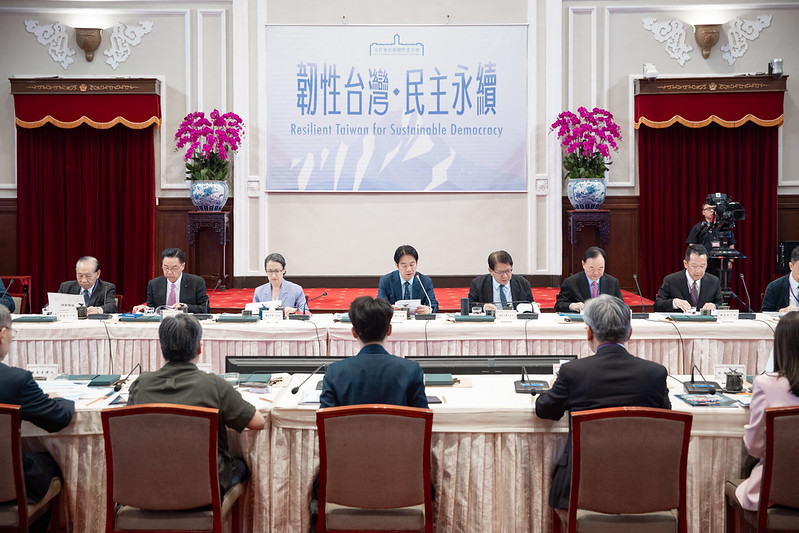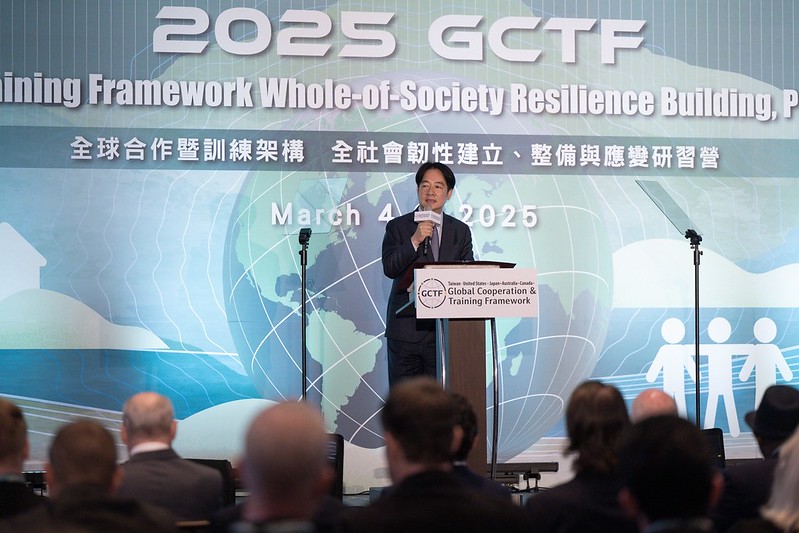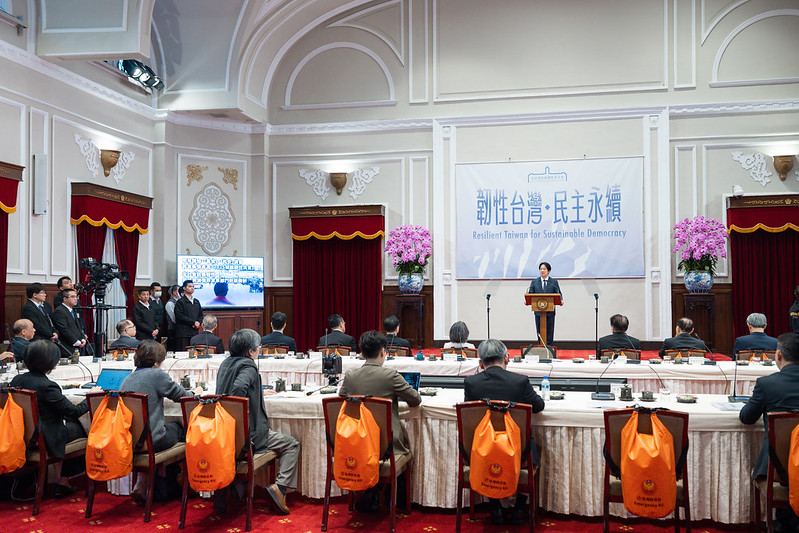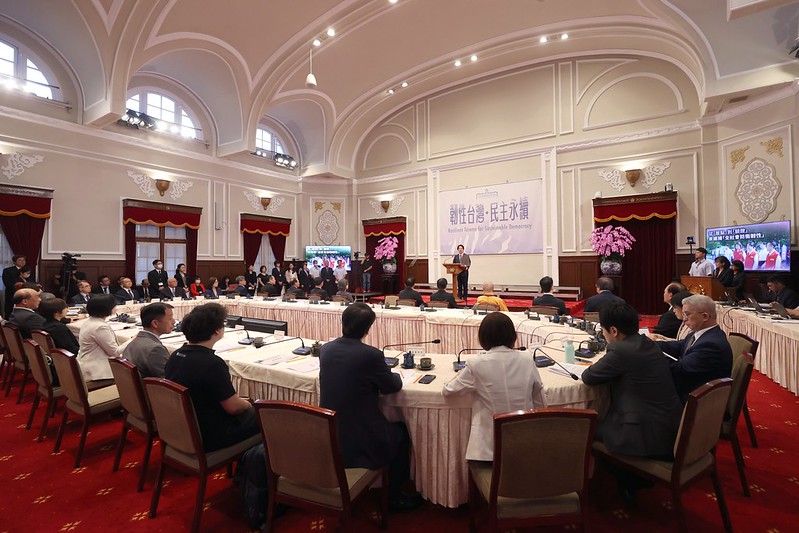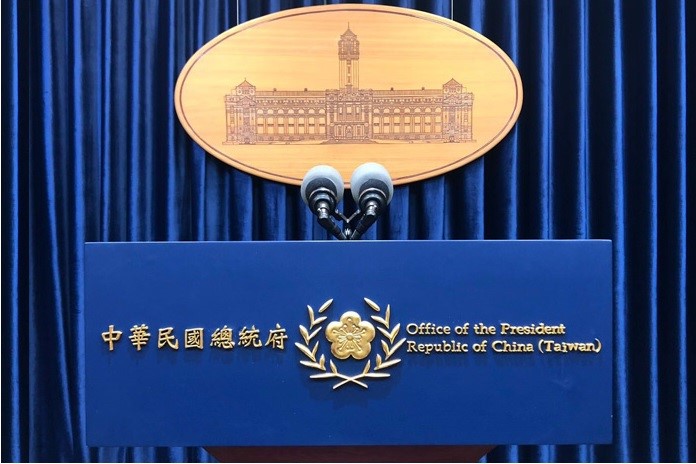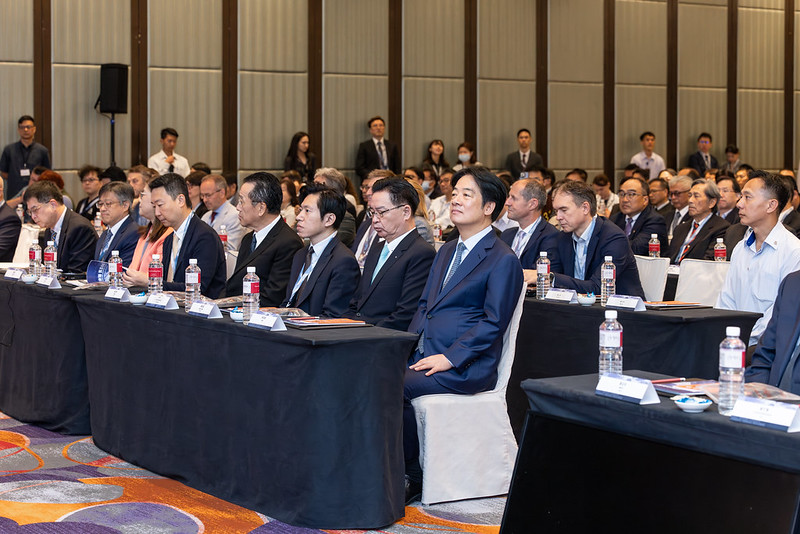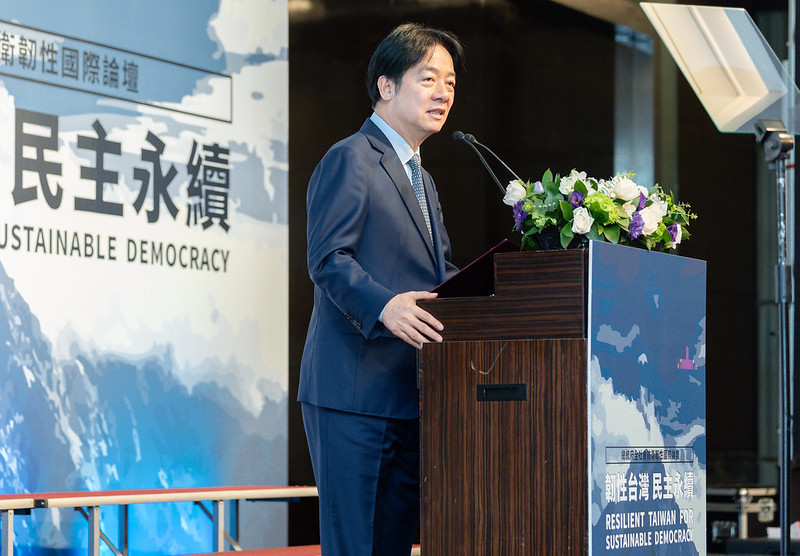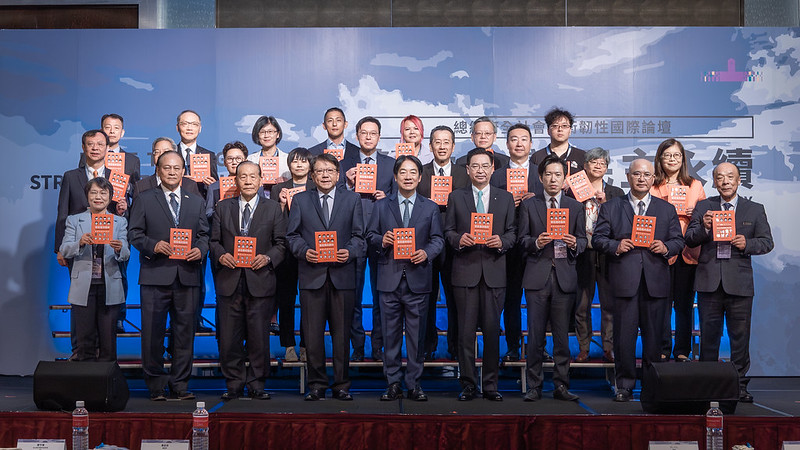News & activities
 News releases
News releases
On the morning of September 20, President Lai Ching-te attended the opening of the Resilient Taiwan for Sustainable Democracy International Forum. In remarks, President Lai stated that as Taiwan and a host of other countries worldwide face the two major challenges posed by extreme climate and authoritarian systems, we must take action and step up our preparedness. The president said that in the year since establishing the Whole-of-Society Defense Resilience Committee at the Presidential Office, we have already taken concrete actions, ranging from tabletop exercises to on-site drills, to bolster the committee’s five lines of effort. In this year’s annual Han Kuang military exercises that were held concurrently with the Urban Resilience Exercises in each city or county, disaster prevention and national defense were integrated for the first time, he pointed out, involving every member of the public, whether military or civilian, regardless of professional background, gender, or age. The president expressed his conviction that the more united we are, the more resilient our country will become; and the more resilient we become, the more able we are to avoid and deter threats.
President Lai emphasized that peace cannot be left up to hope for good faith by the aggressors, and that to avoid war and defend peace, we must build defense capabilities and societal resilience through continued preparedness. At this challenging time, he said, most important is the cooperation among like-minded countries. The president thanked the members of our international team who are joining us from all over the world to observe or participate in the joint exercises and all the experts and scholars participating in today’s forum. He emphasized that the government is taking concrete actions to continually strengthen Taiwan, and that we are enhancing our national defense capabilities and have allocated a budget for resilience in homeland security. He said that this week our Ministry of National Defense released its updated all-out defense manual, “In Case of Crisis: Taiwan’s National Public Safety Guide,” adding that in the future, we plan to ensure that each and every household has access to this guide.
President Lai underlined that freedom and democracy did not come by chance, but through the sacrifice and struggle of countless Taiwanese people. He said that we will never bow to aggression, and that we will stand tall and defend our hard-earned way of life. United and moving forward courageously, he said, the people of Taiwan will continue to shine on the world stage, and that like a mountain, the Republic of China (Taiwan) will stay strong and endure.
A translation of President Lai’s remarks follows:
I would like to begin by welcoming our distinguished guests from home and abroad to the Resilient Taiwan for Sustainable Democracy International Forum. This forum not only marks the Whole-of-Society Defense Resilience Committee’s momentous first anniversary, but also serves as a way to connect Taiwan with the world and demonstrate our determination to defend ourselves.
In this present global situation, Taiwan and a host of other countries worldwide are facing two major challenges.
First, extreme climate-related disasters are posing grave challenges to every country, testing our basic infrastructure and impacting food security and infectious disease control. This has also put our economies and public health systems under massive pressure. We all know that resilience concerns more than just defense and security; it is also the foundation of well-being and societal stability.
Second, regimes within an authoritarian system led by China are building alliances with one another, with the intent to infiltrate and undermine democratic societies. Through military provocations and hybrid war tactics, they attempt to shake our confidence, sow division in our societies, challenge the international community’s bottom line, and gradually alter the status quo in the region and the international order.
These are the two major challenges – one stems from our natural environment, the other from the expansionary ambitions of authoritarian regimes. We have no time to lose. We must take action and step up our preparedness.
That is why, on September 26 last year, I convened the first meeting of the Presidential Office’s Whole-of-Society Defense Resilience Committee, guided by the principles “preparedness through vigilance,” “enhanced response, fearlessness in action,” and “orderly execution, methodical action.” Our work involves five lines of effort: civilian force training, material distribution, energy security, medical care and shelter preparation, and cyber and financial security. This has brought out a spirit of cooperation between the government and civil society.
Over the past year, we have already taken concrete actions to bolster each of these efforts.
From tabletop exercises to on-site drills, all have simultaneously involved central government agencies, local governments, and civil society, enabling us to assess our preparedness plans and identify and promptly address any areas in need of improvement.
We have also integrated disaster prevention and national defense for the first time. During the annual Han Kuang military exercises this year, Urban Resilience Exercises were also held in each city or county. These aimed to help coordinate the defensive operations of the military with local-level evacuation work, medical care, and material distribution, enhancing military–civilian operational capabilities.
We have also officially designated the month the Han Kuang and Urban Resilience Exercises are annually held as National Solidarity Month. This way, our whole-of-society defense and resilience efforts can truly involve all of Taiwan – every member of the public, whether military or civilian, regardless of professional background, gender, or age.
I firmly believe that the more united we are, the more resilient our country will become. The more resilient we become, the more able we are to avoid and deter threats.
Peace cannot be left up to hope for good faith by the aggressors. To avoid war and defend peace, we must build defense capabilities and societal resilience through continued preparedness.
Peace through strength, and strength through resilience: This is our goal. Over the past year, it is not only the central and local governments that have mobilized to step up preparedness. Many private enterprises, volunteer organizations, religious groups, and civil defense NGOs have launched their own resilience and preparedness initiatives, actively partaking in or even hosting training sessions and exercises.
This spirit of unity is exactly what I hoped to see from the formation of the Presidential Office’s Whole-of-Society Defense Resilience Committee, at the national level.
Friends, the reason we are facing threats is not for anything we have done or said, but because we proudly defend our free and democratic way of life, which is intolerable to the ambitions of authoritarian aggressors.
We must be clear – the preparations of authoritarian aggressors are rehearsals for military expansion and changing the world order; our preparations are training to preserve the status quo of peace and the sustainability of freedom and democracy.
We are taking concrete actions to continually strengthen Taiwan, and we will keep enhancing our national defense capabilities. Our defense budget for next year, aligning with NATO standards, will reach 3.32 percent of GDP, and we aim for this figure to reach 5 percent by 2030.
We have also allocated a budget of NT$150 billion for resilience in homeland security, which will be used to enhance whole-of-society defense and resilience. This will include raising the quality and quantity of stockpiled items, enhancing the functionality of cybersecurity equipment, expanding the procurement and development of unmanned vehicles and countermeasure capabilities, establishing disaster prevention coordination centers and warehouses, and improving underground emergency shelters. This budget will go into effect once it passes review by the Legislative Yuan.
My fellow citizens, at this moment, when authoritarian states are converging to challenge the global order, Taiwan is not the only one facing the situation head on; the international community is also moving faster with preparations.
Right now, many countries in Europe are taking faster steps to raise their defense budgets and are making preparations across national and civil defense, across advanced unmanned vehicle systems and traditional air raid shelters, and across telecommunications resilience and protection of critical infrastructure.
In addition, several countries are issuing guides to their people on disaster prevention, emergency evacuation, civil defense, and survival. We have seen the Czech Republic, France, Sweden, and other countries produce public safety guides and even promote safety information for every household. Taiwan is doing the same.
This week, our Ministry of National Defense released its updated all-out defense manual, “In Case of Crisis: Taiwan’s National Public Safety Guide.”
In this guide, we provide essential safety information for the entire population. In addition to the paper copy of the guide, we also have a dedicated website. I am sure you all received the alert messages on your phones during the National Disaster Prevention Day exercises yesterday. In that message is a link to where you can download the guide. In the future, we plan to ensure that each and every household has access to this safety guide.
In a light and easy-to-read style, the guide presents vital information for the public to stay safe during an emergency, and for emergency preparation during safe times. It also tells everyone how to respond during a crisis, while taking into account the specific needs of different groups.
More importantly, we tell everyone, “In the event of a military invasion of Taiwan, any claim that the government has surrendered or that the nation has been defeated is false.”
As commander-in-chief of the armed forces of the Republic of China, I want to tell my fellow citizens and the international community that this is Taiwan’s position. We are determined to defend freedom and democracy and a sustainable Taiwan.
At this challenging time, friends are very important; most important is the cooperation among like-minded countries.
So, I want to thank the members of our international team who are joining us from all over the world to observe or participate in the joint exercises for National Disaster Prevention Day, which is September 21. I also want to thank all the experts and scholars participating in today’s forum, whether as attendees, speakers, or panelists.
The valuable knowledge and experience you bring here will help expand our view of resilient governance and societal defense, as well as deepen our policy design. All of this will advance the close links between Taiwan and the international community.
For today’s forum, we have invited a representative from the Federal Agency for Technical Relief (THW) of Germany to share Germany’s experience in civilian force training. Also invited are representatives from Finland’s National Emergency Supply Agency (NESA) and the Hawaii Emergency Management Agency (HI-EMA) to share their experience in stockpiling. And we have the Israeli organization Magen David Adom (MDA), UK Space Agency (UKSA), Australian Strategic Policy Institute (ASPI), and American Chamber of Commerce in Taiwan (AmCham Taiwan), who will be sharing on issues in healthcare, communications, energy, and financial network security.
I would also like to give special thanks to American Institute in Taiwan Acting Director Karin M. Lang, Head of the European Economic and Trade Office Lutz Güllner, and British Office Taipei Representative Ruth Bradley-Jones. They have all taken the time to join us today, demonstrating the importance they attach to whole-of-society defense and resilience as well as their high regard for Taiwan.
Your participation gives us more confidence as well as clarity in Taiwan’s responsibility to help maintain the status quo of peace and stability in the region.
To close, I would like to share a passage from the recently published national public safety guide: “Freedom and democracy did not come by chance. It was through the sacrifice and struggle of countless Taiwanese people. Thus, we will never bow to aggressors. We will stand tall and defend our hard-earned way of life. United and moving forward courageously, the people of Taiwan will continue to shine on the world. Like a mountain, the Republic of China (Taiwan) will stay strong and endure.”
Also in attendance at the event were expert in European Union Civil Protection from THW Bert Schinkel-Momsen, Director of the Operational Department of NESA Aki Laiho, HI-EMA Administrator James Barros, Head of Disaster Preparedness for MDA Felix Lotan, Chief Scientist of UKSA Adam Amara, ASPI Senior Fellow Ian Satchwell, and President of AmCham Taiwan Carl Wegner.
